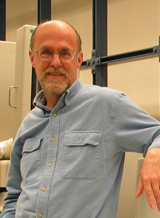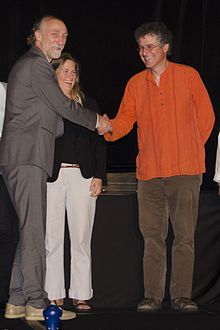
BioPerl is a collection of Perl modules that facilitate the development of Perl scripts for bioinformatics applications. It has played an integral role in the Human Genome Project.

John Frederick William Birney is joint director of EMBL's European Bioinformatics Institute (EMBL-EBI), in Hinxton, Cambridgeshire and deputy director general of the European Molecular Biology Laboratory (EMBL). He also serves as non-executive director of Genomics England, chair of the Global Alliance for Genomics and Health (GA4GH) and honorary professor of bioinformatics at the University of Cambridge. Birney has made significant contributions to genomics, through his development of innovative bioinformatics and computational biology tools. He previously served as an associate faculty member at the Wellcome Trust Sanger Institute.
Reactome is a free online database of biological pathways. There are several Reactomes that concentrate on specific organisms, the largest of these is focused on human biology, the following description concentrates on the human Reactome. It is authored by biologists, in collaboration with Reactome editorial staff. The content is cross-referenced to many bioinformatics databases. The rationale behind Reactome is to visually represent biological pathways in full mechanistic detail, while making the source data available in a computationally accessible format.

The Generic Model Organism Database (GMOD) project provides biological research communities with a toolkit of open-source software components for visualizing, annotating, managing, and storing biological data. The GMOD project is funded by the United States National Institutes of Health, National Science Foundation and the USDA Agricultural Research Service.
Mark Bender Gerstein is an American scientist working in bioinformatics and Data Science. As of 2009, he is co-director of the Yale Computational Biology and Bioinformatics program.

Webb Colby Miller is an American bioinformatician who is professor in the Department of Biology and the Department of Computer Science and Engineering at The Pennsylvania State University.

Sean Roberts Eddy is Professor of Molecular & Cellular Biology and of Applied Mathematics at Harvard University. Previously he was based at the Janelia Research Campus from 2006 to 2015 in Virginia. His research interests are in bioinformatics, computational biology and biological sequence analysis. As of 2016 projects include the use of Hidden Markov models in HMMER, Infernal Pfam and Rfam.

Steven Elliot Brenner is a professor at the Department of Plant and Microbial Biology at the University of California Berkeley, adjunct professor at the Department of Bioengineering and Therapeutic Sciences at the University of California, and San Francisco Faculty scientist, Physical Biosciences at the Lawrence Berkeley National Laboratory.
Suzanna (Suzi) E. Lewis was a scientist and Principal investigator at the Berkeley Bioinformatics Open-source Project based at Lawrence Berkeley National Laboratory until her retirement in 2019. Lewis led the development of open standards and software for genome annotation and ontologies.

Alfonso Valencia is a Spanish biologist, ICREA Professor, current director of the Life Sciences department at Barcelona Supercomputing Center. and of Spanish National Bioinformatics Institute (INB-ISCIII). From 2015-2018, he was President of the International Society for Computational Biology. His research is focused on the study of biomedical systems with computational biology and bioinformatics approaches.

Gary Stormo is an American geneticist and currently Joseph Erlanger Professor in the Department of Genetics and the Center for Genome Sciences and Systems Biology at Washington University School of Medicine in St Louis. He is considered one of the pioneers of bioinformatics and genomics. His research combines experimental and computational approaches in order to identify and predict regulatory sequences in DNA and RNA, and their contributions to the regulatory networks that control gene expression.
Mathieu Daniel Blanchette is a computational biologist and Director of the School of Computer Science at McGill University. His research focuses on developing new algorithms for the detection of functional regions in DNA sequences.

Julian Parkhill is Professor of Bacterial Evolution in the Department of Veterinary Medicine at the University of Cambridge. He previously served as head of pathogen genomics at the Wellcome Sanger Institute.

Bonnie Anne Berger is an American mathematician and computer scientist, who works as the Simons professor of mathematics and professor of electrical engineering and computer science at the Massachusetts Institute of Technology. Her research interests are in algorithms, bioinformatics and computational molecular biology.

Alexander George Bateman is a computational biologist and Head of Protein Sequence Resources at the European Bioinformatics Institute (EBI), part of the European Molecular Biology Laboratory (EMBL) in Cambridge, UK. He has led the development of the Pfam biological database and introduced the Rfam database of RNA families. He has also been involved in the use of Wikipedia for community-based annotation of biological databases.
Julio Collado-Vides is a Guatemalan scientist and Professor of Computational Genomics at the National Autonomous University of Mexico. His research focuses on genomics and bioinformatics.

Janet Kelso is a South African computational biologist and Group leader of the Minerva Research Group for Bioinformatics at the Max Planck Institute for Evolutionary Anthropology. She is best known for her work comparing DNA from previous humans with those of the present.
Peter D. Karp is director of the Bioinformatics Research Group at SRI International in Menlo Park, California. Karp leads the development of the BioCyc database collection. BioCyc databases combine genome, metabolic pathway, and regulatory information for thousands of organisms.
Judith Anne Blake is a computational biologist at the Jackson Laboratory and Professor of Mammalian Genetics.
Zhiping Weng is the Li Weibo Professor of biomedical research and chair of the program in integrative biology and bioinformatics at the University of Massachusetts Medical School. She was awarded Fellowship of the International Society for Computational Biology (ISCB) in 2020 for outstanding contributions to computational biology and bioinformatics.












